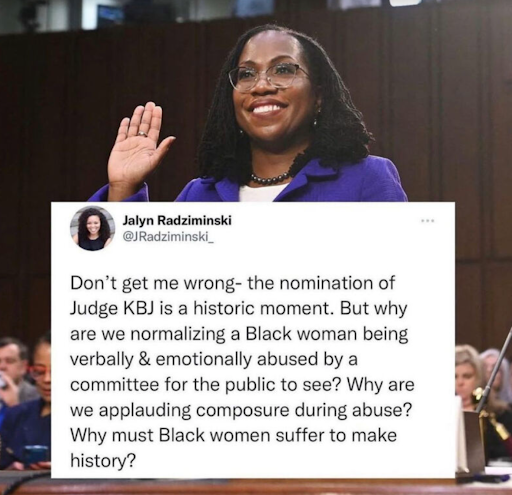We all know too well the frustration and anger behind the composure and “professional” demeanor of Ketanji Brown Jackson during the confirmation hearing last week. It’s what many of us regularly endure in work settings. The major difference is that this played out on a national stage for all to see. While many praise Judge Jackson’s composure, the other side is often unseen – the impact on mental health.

The emotional and physical toll of breaking barriers and being ‘the first’ is significant. The headaches, stomach pains, and other physical ailments that come with smiling through insults, the anxiety of weighing the costs of responding to the latest sexist or racist comment, the depression of being dismissed and overlooked for a new work opportunity, or even for simply speaking.
There’s been so much conversation about how triggering the hearing was for many Black women. Watching Judge Jackson stay poised and composed while being attacked is painful because we have all been where she has. Knowing that if she breaks her composure and shows her humanity, she will be vilified and will suffer the consequences that others do not. This is why the acknowledgment and validation from Senator Cory Booker were so powerful – he saw and spoke to her humanity for everyone else to see and hear.
There are so many ways to respond when we see people being attacked like this. Whether or not we choose to intervene often depends on the value we place on them as human beings. For example, a lot of attention has been given to the slap heard around the world. One of the things that struck me was Jada Pinkett Smith’s in-the-moment response to being publicly insulted. She did something that women, especially Black women, are implicitly and explicitly taught not to do in a public work setting. She visibly showed her anger, disgust, and disagreement with being insulted. She didn’t laugh to make others comfortable or to deflect attention from the ‘joke’. She allowed her humanity to be seen.

There are so many emotions, historical context, and relational complexities from the Supreme Court confirmation hearing and the Oscars. After the shock of “what just happened?” we’re often left raw and vulnerable and unsure of what to do next. This happens in courtrooms, on stages, in workplaces, and even within our families.
Our own reactions can feel even more complicated as we navigate the opinions of others. We don’t need to engage and share our thoughts with everyone. Part of managing our own mental health is setting boundaries on conversations and even opting out as necessary. This is true for everyone.
For Black folk in particular, please don’t assume the burden of representing an entire race in conversations with others. Exercise your power and opt-out of discussions you don’t want to have about the Smith-Rock confrontation. Here are a few phrases to consider using:
- I’d rather not discuss this.
- Let’s talk about something else.
- I’m focusing on work today and I’m not talking about that now.
- I’m not ready to talk about this but I will come to you if I change my mind.
In the end, it’s fitting that these events happened at the end of Women’s History Month, a time when we celebrate women who are the first and persevere in systems not designed for them.











